Пособие по обучению практике устной и письменной речи (начальный этап) на английском языке Под ред. О. В. Серкиной
 Скачать 17.03 Mb. Скачать 17.03 Mb.
|
Weights and MeasuresFor general use the smallest weight is 1 ounce (oz.), and there are 16 ounces in a pound (lb.). The English buy sweets, tobacco, and sometimes cigarettes by the ounce while most groceries or fruit, such as apples, pears, strawberries, by the pound, half-pound or quarter-pound (there are some kinds of fruit that are bought piecemeal, or loose). 14 pounds make up 1 stone. The English always give people’s weight in stones and pounds. For example, a man weighs 11 stone 9 lbs (not 163 lbs). 112 lbs make up 1 hundredweight (cwt), which equals 50 kg. So there are 20 cwt in a ton. Liquids are measured in pints (app. 0.5 liter), quarts and gallons. There are 2 pints in a quart and 4 quarts in a gallon. Finally, for length the principal measurements are the inch (2.54 cm), the foot (30.48 cm), the yard (91.44 cm) and the mile (1.6 km). 2.17. a) Do you know how to ask for things when you don’t know the exact word? Here are some useful words and expressions. a thing, a machine, a tool; stuff, liquid, powder, material, cloth; material/ liquid/ powder/ stuff for …-ing; square, round, oblong, oval, curved, flat, pointed, sharp, blunt; big, medium-sized, small, tiny, narrow, wide, heavy, light, short; metal, glass, plastic, rubber, stone, wood(en), wool(en), rough, smooth, soft, shiny, transparent, unbreakable, inedible, warm, waterproof; fragile, hard, flexible, rigid, fast, slow; extremely, very, rather, quite, fairly; neither … nor, not at all, about the size of a …, a bit bigger than a …, not quite as heavy as a …, small enough to hold in your hand; a point, an end, a hole, a handle; a thing with a hole/ handle, etc.; a thing/ tool/ machine for making …, cutting …, etc./ to make …, to cut …; a thing that you .. with/in/on, etc.; a thing that goes on top of/ under/ .. .; you use it for … -ing; it is something to write on. What does it feel like? What’s it made of? What shape is it? What size is it? ACQUIRING COMMUNICATION SKILLS 2.18. a) Read the text and answer the questions that follow. b) Work with a partner and act out the conversation of Mr. and Mrs. Baxter during their shopping round. The Baxters Go Shopping The other day my wife took me on a usual shopping round. In fact I hate going to the butcher's, grocer's and other shops of this sort, but of course I have to help my wife about the house. First, we bought some pork and beef at the butcher's. Then we dropped in at the grocery and greengrocery. Jill wanted to buy salt, tomatoes and cucumbers. We also called at the baker's where we bought a loaf of brown bread, some buns and biscuits. On our way home, we were passing Selfridge’s. “Let’s drop in here for a while. You need a suit for everyday wear”, my wife said. I agreed. Selfridge’s is still one of the biggest and most popular stores in London. They sell everything here. All the things for sale are on the counters. The customers walk round and choose what they want. The store has several departments: Women's clothes, Men's clothes, Shoes, Toys, Sports goods, Umbrellas, Leather goods, China and glass, Food, etc. When we entered the shop, we went straight to the men’s department. A salesgirl showed us a number of suits, but we didn’t like any of them. One of them was a bit loose on me, another was too tight. As to the third one, our opinions were quite different. I liked the suit. My wife found it too expensive. She wanted a suit as good as that one but less expensive. The salesgirl showed us a cheaper suit. It was of good quality, but I didn't like the style. We were about to leave the counter when they delivered a new selection of goods. They were not only suits but different kinds of clothes: coats, raincoats, shirts, jackets and trousers. I tried on two or three suits. The last one was all right. It was just my size and fitted me perfectly. We both liked the suit and the price was not high. “We’ll take it, wrap it up, please!” I said to the salesgirl. After we left the men's department, my wife spent the rest of the morning trying on hats. She wanted a pink straw hat to match one of her summer frocks. There was such a good selection of hats in the shop that in the end Jill bought two. Questions:
b) Describe your usual shopping round. Say what shops you usually drop in, what goods you buy, how long it usually takes you, etc. 2.19. a) Read the following dialogues, paying attention to the words in bold. b) Compare the way of buying non-food goods in English-speaking countries and Russia. c) Make up similar dialogues with a partner, changing some items from the original dialogue. Situation 1: Sybil Bentam and Paula go shopping and on a tour of Montreal S.: Good morning, Paula. Did you sleep well? P.: Good morning. Fine, and you? S.: So-so. But it doesn’t matter. Let's go to our new department store, it’s a fine place and there is a very wide choice of goods. And you can have goods for the value of your money. What would you like to buy? P.: Oh, I have to buy a lot of things. Mr. Virge asked me to buy some souvenirs for his family. S.: Shoot off! P.: Well, I have to buy a box of make-up for his wife, a beautiful and colourful pencil box for his seven-year-old daughter, white socks with a red maple leaf for his 14-year-old son and some spices for his mother. S.: And what would you like for yourself? P.: I'’ like a comfortable pair of walking shoes as I do a lot of walking around. S.: Let’s start with the footwear department then. Situation 2: At the Footwear Department Shop assistant: Good morning, can I help you, madam? S.: Well, we’d like some nice walking shoes, please, size 6. Shop assistant: What colour would you like? P.: Something in light brown, please. Shop assistant: Here you are, here’s a shade darker, and some very light. P.: Oh, this light-coloured pair looks wonderful, I’ll try them on. S.: How are they? P.: A bit tight, I’m afraid, the length is right, though. S.: Haven’t you got shoes wider at the toes? Shop assistant: I’ll see... Sorry, but not the same colour. Only those of a darker brownish shade. P.: May I try them on? Shop assistant: Of course, madam. P.: They are wonderful, very comfortable, too. Yes, I’ll take them. How much are they? Shop assistant: Ninety-nine dollars and ninety cents. S.: Do you want anything else here at the footwear department? P.: Oh look! What lovely slippers, so light and soft. They’d suit my granny very much. How much are they? Shop assistant: Oh, they’re fairly cheap, they are on the clearance sale for a reduced price as they are going out of fashion, they are only nine dollars. P.: I’ll take them. Thank you. That’s all I think. S.: Let’s go to the cashier’s desk and pay. Cashier: One hundred and eight dollars and ninety cents, please. P.: Here you are. Cashier: Thank you. And here is your change, madam. Situation 3: At the Perfumery Counter Shop assistant: Good morning. Is there anything you’d like to have? S.: Yes, show us some boxes of make-up, please. Shop assistant: Large or small? S.: Could you show us both of them? Shop-assistant: Here you are. P.: Oh, this big one is very beautiful, there are five different eye shadows, with matching lipsticks, mascara and even powder. But I’m afraid, it’s too expensive for me. How much is it? Shop-assistant: Fifty-nine dollars. P.: That’s too much. Isn't there anything cheaper of the bigger ones? Shop-assistant: I’m afraid not. Only those small ones. S.: Oh look, Paula, you buy this small box of different eye-shadows and in addition a couple of matching lipsticks, mascara isn’t so important. Shop-assistant: This way it will really be much cheaper. It’ll be only nineteen dollars. P.: Well, that suits me all right. S.: Fine. We’ll take this small box of eye-shadows and these two lipsticks. Shop-assistant: And wouldn’t you like a couple of bottles of nail varnish to match? P: No, thank you. That’s enough. Situation 4: At the Hosiery Department Shop assistant: May I show you something? S.: Do you have white socks with a maple leaf? Shop assistant: Oh, yes, quite a lot of them. But wouldn’t you have those striped ones? They are extremely fashionable now. P.: Oh, they look just what he would like. How much do they cost? Shop-assistant: The price isn’t very high, though. Ten dollars only. P.: That’s quite a lot of money for me. Let’s go and take a look at pencil boxes first and then we’ll see. S.: That’s a good idea. We’ll come back, thank you. Shop-assistant: Thank you. You are welcome. Situation 5: At the Stationery Department P: Oh, how many beautiful pencil boxes! I can’t make my choice. S.: Well, look, this pink one with those nice flowers on it. You can zip it very easily. P.: Won’t it get stuck? S.: Those with studs aren’t any safer. P.: But what about this one closing with magnets? S.: Yes, I think that’s the best and it’s very beautiful, too. P.: Let’s ask for the price. I have to think about it. S.: How much does this pencil box cost? Shop-assistant: Six dollars, madam. P.: All right, I’ll take it. And now for the socks. S.: Well, that’s that. I like shopping. But now let’s have a cup of coffee. I hope you are not tired. P.: Oh no, not at all. 2.20. a) Read the lines of two conversations in a clothes shop. Who says them - the customer or the shop assistant? b) Work with a partner and put all the lines in the correct order. c) Practice the conversation with a partner. 1) In a Clothes Shop a ___ Can I help you? b ___ Oh yes. I like that one much better. Can I try in on? c ___ $ 45.99. How do you want to pay? d ___ Yes, please. I’m looking for a shirt to go with my new suit. e ___ Blue. f ___ Yes, of course. The changing rooms are over there. g ___ OK. I’ll take the white. How much is it? h ___ Can I pay by credit card? i ___ What colour are you looking for? j ___ No, it isn’t the right blue. k ___ No, it’s a bit too big. Have you got a smaller size? l ___ That’s the last blue one we’ve got, I’m afraid. But we’ve got it in white. m ___ Well, what about this one? It’s a bit darker blue. n ___ What about this one? Do you like this? o ___ Is the size OK? p ___ Credit card’s fine. Thank you very much 2) In a Clothes Shop a ___ Erm .. this jumper … have you got this in a large? b ___ Does it fit OK? c ___ Thanks. d ___ No, I’m just looking, thanks. e ___ Can I help you at all? f ___ No, we’ve only got the small and the medium, but the sizes are quite big. Try it on – the fitting room’s behind here … there you are. g ___ Yes, it fits perfectly, actually … h ___ Well, if you want anything, juts give me a call … i ___ Mmm, I don’t know about the colour, myself. … This cream’s going to get very dirty … j ___ Yes, it does. It looks really good on you. That colour suits you. 2.21. Read the conversation below which is not nice because no one says any polite phrases in it. Make it more civilized by adding polite phrases or changing some phrases to polite ones. Chemist: Come in. Customer 1: Is this the chemist’s? Chemist: Yes. What do you want? Customer 1: Give me this medicine. Chemist: Do you want it now? Customer 1: Yes. As quickly as possible. Chemist: It’ll take a long time to prepare it. Customer 1: I’m in a hurry. Try to do it quickly. Chemist: All right. Sit down. Customer 1: (treads on another customer’s foot. Says nothing) Customer 2: Ouch! Customer 1: (says nothing) Chemist: Here is your medicine. Twenty euros. Customer 1: (says nothing, pushes past another customer and goes out) 2.22. Complete the following dialogue. Act it out with a partner. Make up similar dialogues using the pictures below. Shop-assistant: Are you being served, Sir / Madam? Customer: I’m looking for a ____________ . Shop-assistant: ________________ are over there. Follow me, please. Customer: Thank you. I’d like to have __________________. Shop assistant: I see. And what’s your size? Customer: _____ or _______. It depends on the style. Shop assistant: These are really very beautiful and the quality is very good. Customer: I think I need a lager size. How much is it / are they? Shop assistant: $ 24.90. A real bargain. Customer: Oh, really? I guess I’ll take _________. Do I pay here? Shop assistant: No, at the cash desk / check-out, please. 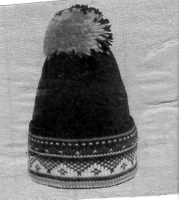 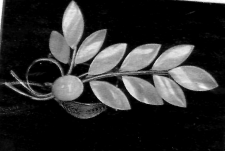 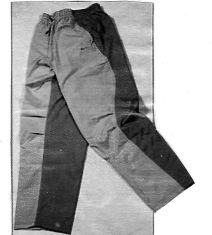 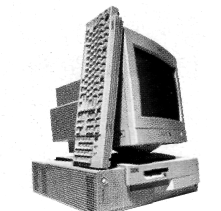 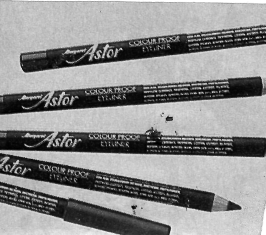 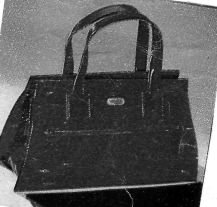 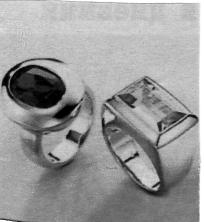 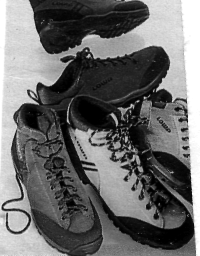 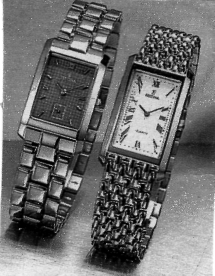 Customer: ____________ . Customer: ____________ .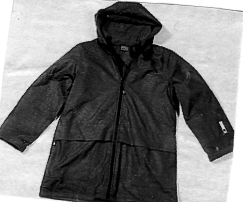 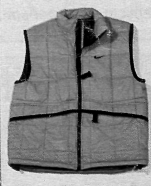 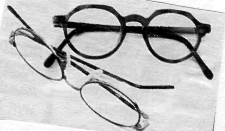 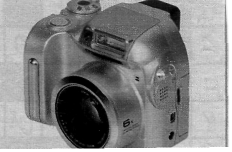 2.23. Read the text and discuss. Think of some embarrassing or funny situation that happened to you in a shop. Discuss it with a partner. A Bad Day Monday is not my best day, and last Monday was worst of all. I woke up late, so I tried to hurry. I didn't want to be late to work. First, I burned my breakfast, so I couldn't eat it. Then I got coffee on my blouse and I had to change it. While I was washing the dishes, I broke a plate. I left the house at 8.45 am. But I forgot my bag, so I had to go home to get it. Of course, I was late to work. The boss didn't say anything but he was looking at me all the time. At noon I wanted to relax. I went out to buy some new clothes. I was trying on blouses when I looked at my watch. It was 1.00 p.m. I would be late to work again. I forgot to take off the store's blouse and put on my own. I dropped my blouse on the table and started to leave wearing a new blouse. The clerk called, "Hey, lady. Aren't you going to pay for it?" My face was really red. Everyone looked at me. I paid for the blouse. It was already 1.15 p.m. I didn’t go back to work. I went straight home and got into bed. It was the only safe place for me that day. 2.24. Read the passages below and discuss some department stores of your town in a small group: which of them have the best stock, the best location, the best staff, etc. Bob's Bargain Department StoreBob’s Bargain Department Store is the cheapest store in town. However, even though it’s the cheapest, it isn’t the most popular. People don’t shop there very often because the products are bad. In fact, some people say the products are the worst in town. The furniture isn’t very comfortable. The clothes aren’t very modern. The appliances aren’t very dependable. Besides that, the location isn’t very convenient, and the salespeople aren’t very helpful. That’s why people don’t often shop at Bob’s Bargain Department Store, even though it’s the cheapest in town. The Lord and Lady Department Store The Lord and Lady Department Store sells very good products. In fact, some people say the products there are the best in town. They sell the most comfortable furniture, the most modern clothes, the most dependable appliances and the best TV and DVD-players. And besides that, their location is the most convenient, and their salespeople are the most helpful in town. However, even though the Lord and Lady Department Store is the best store in town, people don’t often shop there because it’s the most expensive. 2.25. Imagine that you are at a store and need one of the things in the pictures below, but you don’t know the English word for it (or it has just slipped your mind). Explain to a partner (who is a shop-assistant at the moment) what you need without using the name of the object or your hands. 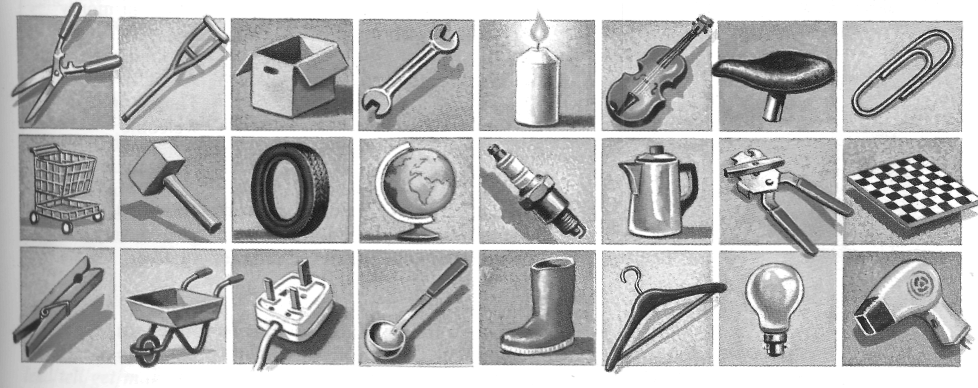 2.26. a) Read the following dialogues, paying attention to the words in bold. b) Compare the way of buying foodstuffs in English-speaking countries and Russia. c) Make up similar dialogues with a partner, changing some items from the original dialogue. 1) Shopping for Food Mary: Isn’t it good that we have bought this refrigerator, Mama? Now we can buy in the things we need for the whole week. Mother: Yes, it is very convenient indeed. Now, Mary dear, I’d like you to do some shopping as I am very busy now. I’ll send Tom along with you. Mary: Yes, Mother dear. What do you want me to buy? Mother: Make a shopping list, please. First, buy some beef. Mary: How much beef, Mother? Mother: Well, let it be 2 or 3 pounds, but see that it is fat. The last time I was there he managed to wrap up a joint which happened to be very lean. If he plays such a trick on me again, I’ll never buy at his shop any more. That done, you buy 6 pounds of potatoes, I think six will do, and a good-sized cabbage. Mary: Any beans, Mother dear? I like them very much. Mother: Yes, buy 2 pounds of them. Now, we shall also need nuts and apples. Mary: What sort, mom? Cooking apples or for eating? Mother: Buy 2 pounds of each. Put down a pound of mixed nuts and a dozen oranges as well. Then, buy one loaf of bread and … Mary: White? Mother: Yes, a dozen fancy cakes, and one pound of fruit cake. That’ll be all there. Drop at the dairy section and buy a dozen eggs. Mary: Aren’t we going to need some milk today, ma? Mother: Yes, I think we shall. Don’t forget to take the milk-can. A pint and a half will do, I suppose. Oh, and don’t forget to buy a pound of fresh butter, a pound of bacon, but not too fat. You watch them closely or you will be cheated – they’ll give you it all fat. You might as well buy the sweets – a pound of caramels and a pound of chocolate with nut filling. Check up the expiration date. Mary: What kind of caramels, mom? Mother: At a shilling a pound. Well, get the shopping basket ready. Now where is that boy? You can never find him when he is wanted. Tom! Mary: No need to call him, Mama. He’s out in the street. Give me the money, please and off I go. |
